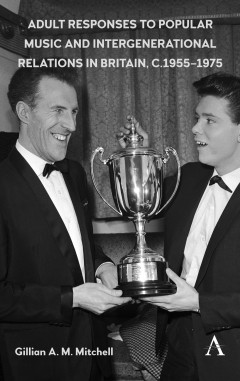Adult Responses to Popular Music and Intergenerational Relations in Britain, c. 1955–1975
By Gillian A. M. Mitchell
Other Formats Available:
E-Book- About This Book
- Reviews
- Author Information
- Series
- Table of Contents
- Links
- Podcasts
About This Book
‘Adult Reactions to Popular Music and Inter-generational Relations in Britain, 1955–1975’ challenges the often unquestioned assumption that ‘the older generation’ largely reacted in a negative or hostile fashion to forms of music popular with young people in Britain from the 1950s to the mid-1970s (including rock ’n’ roll, skiffle, ‘beat’ and rock music), and that the music invariably exacerbated inter-generational tensions. Utilizing extensive primary evidence, from first-person accounts to newspapers, television programmes, surveys and archive collections, the book demonstrates the considerable variety which frequently characterized adult responses to the music, whilst also highlighting that the impact of the music on inter-generational relations was more complex than is often assumed. There has been a growing recognition among scholars of the need to reassess the alleged ‘generation gap’ of this era, but this theme has yet to be examined in depth via the prism of popular music. [NP] The book is also distinctive in the thematic approach it adopts. Rather than attempting a chronological survey, it identifies three key arenas of British society in which adult responses to popular music, and the impact of such reactions upon relations between generations, seem particularly revealing and significant, and explores them in considerable depth. The first chapter examines the place of popular music within family life, the second focuses on the Christian churches and their engagement with popular music, particularly within youth clubs, and the third explores ‘encounters’ between the worlds of traditional Variety entertainment and popular music. The work offers detailed appraisals of each of these areas, while also providing fresh perspectives on this most dynamic and turbulent of periods.
While each chapter possesses a certain cohesion in its own right, illuminating and adding fresh perspectives on key topics within post-war British history, certain key ideas reappear throughout the work. The nature and significance of ‘everyday’ multi-generational consumption of popular music constitutes one such theme, as does the manner in which the highly varied, and ever-evolving, character of ‘pop’ in this era frequently, and in various ways, rendered it more accessible to older people and more capable of traversing generational boundaries. The final unifying theme concerns the distinctive way in which ‘old’ and ‘new’ cultural forces continued to interact in the lives of young and old during this transitional era.
Reviews
Adult Responses to Popular Music presents its arguments in three main chapters. The first chapter covers how contemporary generational differences were navigated within nuclear families. Drawing primarily on oral history sources, the chapter argues that, while some parents held negative attitudes towards their children’s interest in contemporary popular music, this negativity was not always expressed as outright hostility. Chapter Two discusses how youth clubs and Christian institutions responded to, and largely accommodated, youth culture and popular music. Chapter Three contends with the decline of variety theatre in the 1950s and 1960s and how youth culture changed the face of contemporary leisure — Jacob Bloomfield; Zukunftskolleg/
Author Information
Gillian A. M. Mitchell is lecturer in history at the University of St Andrews, Scotland, UK.
Series
Anthem Studies in British History
Table of Contents
Acknowledgements; Introduction; 1. ‘You Go Halfway, Don’t You?’ Family Life, Generational Identity and Popular Music; 2. ‘To Have Done Something’: The Christian Churches, Youth Clubs and Popular Music; 3. ‘You’ve Got to Be Able to Entertain People’: The Encounter between Popular Music and the Worlds of Variety and ‘Light Entertainment’; Conclusion; Bibliography; Index.
Links
Stay Updated
Information
Latest Tweets



